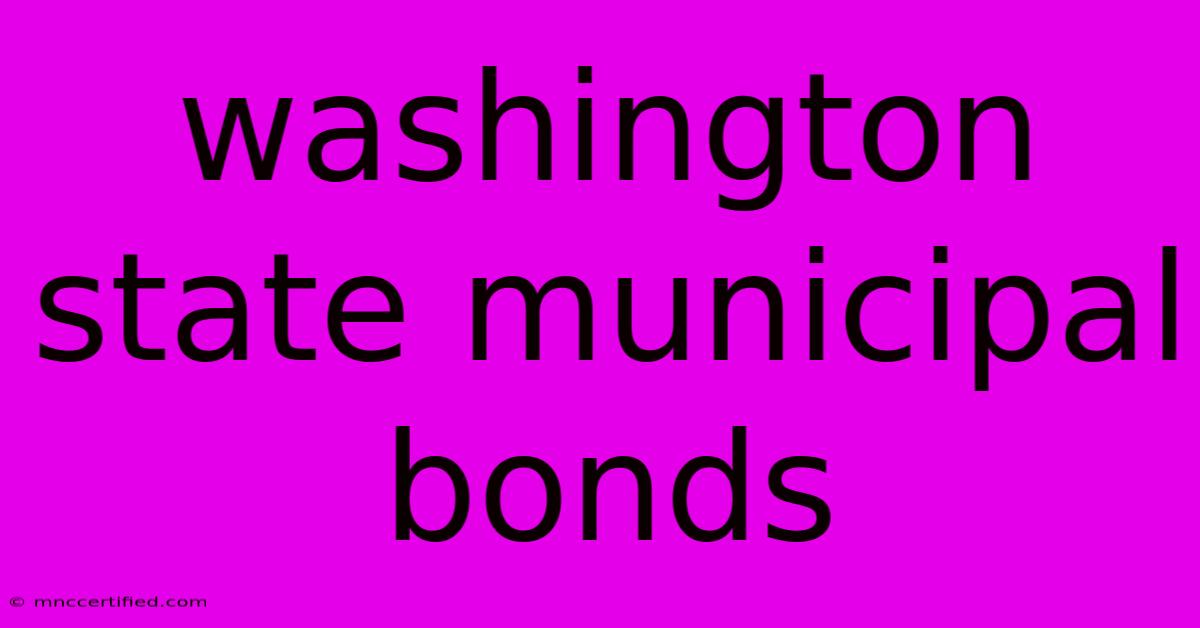Washington State Municipal Bonds

Table of Contents
Washington State Municipal Bonds: A Deep Dive for Investors
Investing in municipal bonds offers a compelling blend of potential returns and tax advantages. Washington State, with its diverse economy and strong credit rating, presents an attractive market for those seeking municipal bond opportunities. This comprehensive guide explores the intricacies of Washington State municipal bonds, covering key aspects to help you make informed investment decisions.
Understanding Washington State Municipal Bonds
Washington State municipal bonds are debt securities issued by state and local governments within Washington to finance public projects. These projects can range from essential infrastructure like roads and bridges to crucial public services such as schools and hospitals. Investing in these bonds essentially means lending money to these entities, receiving regular interest payments in return.
Key Features of Washington Municipal Bonds:
- Tax Advantages: Interest earned on most Washington State municipal bonds is exempt from federal income tax. This makes them particularly attractive to high-income earners seeking to reduce their tax burden. Note: Always consult with a tax professional to determine the tax implications specific to your situation. State tax implications may also vary.
- Creditworthiness: Washington State generally enjoys a strong credit rating from major rating agencies. This reflects the state's fiscal health and reduces the risk of default. However, always review the specific credit rating of the individual bond issue before investing.
- Maturity Dates: Municipal bonds have varying maturity dates, ranging from short-term to long-term. Choosing a maturity date aligns with your investment timeline and risk tolerance. Shorter-term bonds offer lower risk but potentially lower returns, while longer-term bonds offer higher potential returns but greater risk.
- Interest Rates: Interest rates on Washington State municipal bonds fluctuate based on market conditions, the issuer's creditworthiness, and the bond's maturity date. Higher creditworthiness typically translates to lower interest rates.
- Issuer Variety: Investment opportunities extend beyond the state level. County, city, and special district bonds also provide diversification within the Washington State municipal bond market. This allows investors to potentially access diverse projects and risk profiles.
Types of Washington Municipal Bonds
Washington State municipal bonds come in various forms, each with its own characteristics:
- General Obligation Bonds: Backed by the full taxing power of the issuing government. These are considered relatively low-risk.
- Revenue Bonds: Secured by the revenue generated from the project financed by the bond. The risk is higher than general obligation bonds as the repayment depends on project success.
- Tax-exempt bonds: As discussed above, the interest income is generally exempt from federal taxes.
- Taxable bonds: While less common, some municipal bonds may be subject to federal income tax.
Investing in Washington State Municipal Bonds
Investing in Washington State municipal bonds can be done through various avenues:
- Directly through the issuer: Some municipalities allow direct purchases, though this is often less common for individual investors.
- Through a broker-dealer: This is the most common method for individual investors. A broker-dealer can provide access to a wide range of bonds and offer investment advice.
- Mutual Funds or ETFs: These offer diversification by investing in a portfolio of municipal bonds, including those issued in Washington State. This reduces individual issuer risk.
Risks Associated with Washington State Municipal Bonds
While generally considered relatively safe, investing in municipal bonds still carries some risks:
- Interest rate risk: Changes in interest rates can impact the value of your bonds.
- Default risk: Although rare for Washington State bonds due to its strong credit rating, the issuer could default on its obligations.
- Inflation risk: Inflation can erode the purchasing power of your interest payments over time.
- Liquidity risk: Some bonds may be less liquid than others, making it difficult to sell them quickly without a loss.
Finding Information on Washington State Municipal Bonds
Information on Washington State municipal bonds can be found through various sources:
- EMMA (Electronic Municipal Market Access): A comprehensive online resource for municipal bond information.
- Financial news websites: Websites specializing in financial news often provide analysis and information on municipal bonds.
- Municipal bond broker-dealers: Broker-dealers can provide detailed information and assist in investment decisions.
Conclusion: Navigating the Washington State Municipal Bond Market
Washington State municipal bonds offer a valuable investment opportunity for those seeking tax-advantaged income and diversification within their portfolio. However, it's crucial to thoroughly research individual bond offerings, understand the associated risks, and consider seeking professional financial advice before making any investment decisions. Remember, understanding the nuances of bond maturity, credit ratings, and the specific issuer are all critical aspects of a successful municipal bond investment strategy.

Thank you for visiting our website wich cover about Washington State Municipal Bonds. We hope the information provided has been useful to you. Feel free to contact us if you have any questions or need further assistance. See you next time and dont miss to bookmark.
Featured Posts
-
What Is Blanket Insurance Policy
Nov 21, 2024
-
Insurance Companies Princeton Wv
Nov 21, 2024
-
Remembering Kristofferson Mc Brydes Tribute
Nov 21, 2024
-
Christmas Movie Murrays Hard Workout
Nov 21, 2024
-
Eruption At Sundhnukur Fissure Swarm
Nov 21, 2024